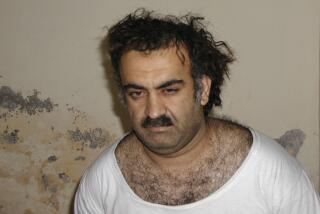U.S. Hails Pakistan Vow to Go on With Election : Gets Signal Islamabad Will Preserve Zia’s Foreign Policy in Wake of His Death
- Share via
WASHINGTON — The Reagan Administration, closely monitoring the uncertain political atmosphere in Pakistan after the plane crash that killed President Zia ul-Haq, Thursday encouraged its Southwest Asian ally to continue moving toward its previously scheduled election in November.
Setting down the broad outlines of American policy toward Pakistan, a State Department spokeswoman said the Reagan Administration welcomes indications from Islamabad that Pakistan will preserve Zia’s foreign policy and that it will keep moving toward democracy.
An announcement by Ghulam Ishaq Khan, the new president of Pakistan, that his government will go forward with the election called by Zia for Nov. 16 is “a welcome sign,” spokeswoman Phyllis Oakley said.
Threat of Instability
Her remarks appeared to indicate that the United States does not want Pakistani military officials or other leaders to use Zia’s death and the threat of instability following it as a rationale for calling off the vote. Zia himself frequently had canceled elections during his own 11-year rule.
The Administration announced that Secretary of State George P. Shultz will head the American delegation to Zia’s funeral in Islamabad on Saturday. At the same time, the United States dispatched an eight-member team of experts to investigate the cause of the crash, which also killed U.S. Ambassador to Pakistan Arnold L. Raphel and Army Brig. Gen. Herbert M. Wassom, the U.S. military attache.
Defense Department officials said the investigative team will be in Pakistan for about two weeks. U.S. officials reiterated Thursday that they have no hard information on what might have caused the C-130 transport plane to explode Wednesday shortly after takeoff.
President Reagan on Thursday sent a message to Pakistan’s new president reaffirming American support for his government.
“Let us all rededicate ourselves to the task of regional peace and reconstruction to which President Zia dedicated his life,” Reagan said. “As you carry out your heavy responsibilities in his absence, please count on the United States for support.”
In an apparent gesture of good will toward the Soviet Union, the State Department also said Thursday it is satisfied that the Soviets have kept their promise to withdraw about half of their forces from Afghanistan by the deadline last Monday.
The Soviet Union had more than 100,000 combat and support troops in Afghanistan on May 15. Under the Geneva accords signed in April, it promised to pull out half these forces by Aug. 15 and the rest by next Feb. 15.
Without citing specific figures, Oakley said that “roughly half of all Soviet combat troops” and “a number of support troops” have been withdrawn. She called upon the Soviet Union to complete its withdrawal by the end of December, the ninth anniversary of the Soviet invasion.
Such a timetable would enable the Administration to commemorate the completion of the Soviet pullout before President Reagan leaves office Jan. 20.
Positive Tone
The State Department had promised last Monday to release within a few days its conclusions on whether the Soviet forces had met the Aug. 15 deadline. The positive tone of Thursday’s statement suggests that there is no evidence at this point of Soviet involvement in sabotaging the plane in which Zia was killed.
Last May, Zia had dismissed his entire Cabinet and disbanded the National Assembly at a time when Prime Minister Mohammed Khan Junejo was about to make public a report criticizing Pakistani military officials for an ammunition dump explosion in Rawalpindi that left more than 100 dead. After an outpouring of criticism both in Pakistan and in the U.S. Congress, Zia then called for elections Nov. 16.
In addition to Shultz, the American delegation to the funeral will include Undersecretary of State Michael H. Armacost, who has played the leading role in negotiations on the Soviet withdrawal from Afghanistan.
On Thursday, Reagan telephoned Nancy Ely-Raphel and Judy Wassom, the widows of the American ambassador and the defense attache, and the ambassador’s mother, Sara Raphel, to express his condolences.
The State Department said that flags at all American diplomatic posts will be flown at half-staff until Raphel’s funeral. He was the first U.S. ambassador to be killed while carrying out his duties since U.S. Ambassador to Afghanistan Adolph Dubs in 1979.
More to Read
Sign up for Essential California
The most important California stories and recommendations in your inbox every morning.
You may occasionally receive promotional content from the Los Angeles Times.













